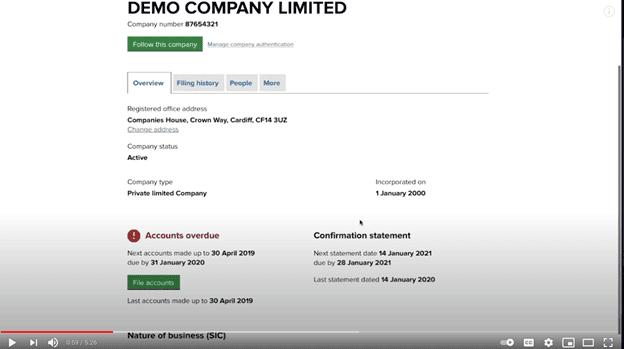By Ashley Preen
June 22, 2021

Although there are numerous benefits to registering a private limited company, one of the drawbacks is the requirement to prepare and submit Company Accounts every year. And there are penalties if the filings are late.
Many small businesses and micro-entities feel this is a necessary burden, and that the pros of registering a limited company far outweigh the cons. But it doesn’t change the fact that these accounts require time to prepare.
Some online accounting software can go a long way to getting all the data you need to file your company accounts. But you are ultimately responsible for ensuring all the information provided is accurate and complete. So, the onus is on you to keep your bookkeeping and small business accounting up to date so you can file your company accounts in a timely manner and avoid penalties from HMRC.
In our experience dealing with hundreds of different startups and small businesses, many heads of companies have similar questions about company accounts, how to file them, how to prepare them, and other questions that we hope to definitively answer for you in this post.
The first of those questions, especially from new entrepreneurs, is by far…
When you register a limited company in the UK, you are required by law to file “Company Accounts” once a year. The full name of this filing is “Company Statutory Accounts” because their filing is required by law.
Another common term for this is “Annual Accounts.”

The simple definition of Company Accounts is that it is a filing that shows HMRC your financial status for the last year, your earnings, and your tax-deductible expenditures. Your corporate tax return is a separate filing, although many companies submit it at the same time.
Corporation Tax is different from what you pay as an individual. Registered limited companies are considered to be separate legal entities from their directors, employees, shareholders, or any other person connected with the business. That’s what makes them so appealing because it minimises the potential risk to directors’ personal finances if the limited company ever goes bankrupt.
Currently, the UK’s corporation tax stands at 19% for companies with profits lower than £50,000 for the year. Companies that have profits between £50,000 and £250,000 pay corporate tax on a rising scale, depending on how much they have earned, up to a maximum of 25% corporate tax for companies who score a profit of over £250,000 for the year.
Part of the frustration of Company Accounts is that they must be filed twice, once with HMRC, and once with Companies House. You have to send the complete accounts with all details to HMRC for tax purposes, but you only have to send an abbreviated version to Companies House.
Small businesses and micro-entities can submit to both HMRC and Companies House directly via the Companies House website.
Company Accounts consist of:
Sometimes, there can be additional notes and documents added to the above, but the above forms the core of the annual company accounts.
A directors’ report is a statement of the financial status of a company, prepared by the directors of the company.
A small company or micro-entity which is exempt from providing an audit report (more info on this lower down) does not have to submit a directors’ report as part of the annual company accounts.
Micro-entities are defined as companies that:
A Profit and Loss Statement (or P&L Statement, or Income Statement) is a financial report that lays out a company’s earnings and expenditures over a period of time such as one month, a quarter, or a year. (For the annual company accounts, a period of twelve months is used.)
Like the Director’s Report, this financial report is not mandatory for small businesses and micro-entities when submitting Company Accounts.
The balance sheet is the first mandatory financial report for all companies submitting their Company Accounts, regardless of their size.
A balance sheet shows a company’s financial standing at a specific point in time. It is essentially a physical representation of the accounting formula which is “Assets = Liabilities + Equity.”
Many of the popular accounting software tools provide balance sheets at the click of a button.
The Cash Flow Statement shows the company’s precise cash situation over a period of time such as a month, quarter or twelve months. (For the Company Accounts, the time period would be twelve months.)
For companies operating on the Cash Method of accounting, the cash flow statement and P&L statement would be identical because the date of “income received” would be the date the cash actually entered the account and not the date of the invoice. But Limited Companies are forbidden from using the Cash Method of accounting in the UK, and must use the Accrual Method, so the P&L and Cash Statement would look different. (More info on this below.)
The main work that accountants in the UK carry out for limited companies is the preparation of clients’ Company Accounts.

Limited Company Accounts must be prepared to very precise accounting standards to be accepted by HMRC. All the rules of accounting need to be followed and extensive knowledge of tax and accounting is necessary to understand all of what is being filed.
Often, directors ask us, “Can I prepare and submit my own limited company accounts?”
Well, legally, yes. Practically, however, it’s best to use an accountant. You will save time, headaches, and likely also money as a result of no erroneous values being sent over to HMRC.
There is special accounting software that assists accountants to prepare company accounts. The license fees are pretty hefty so it still makes sense to hire an accountant to do your company accounts as opposed to trying to do them yourself.
Company Accounts must be filed precisely nine months after the company’s fiscal year-end. In your first year of business, however, your first set of Company Accounts is only due 21 months after the date of incorporation.
If you’ve lost track of your filing dates, Companies House will be able to provide these for you. Just type in your company number into the Companies House website and they will be able to give you the details on when your filing is expected.
Incidentally, you can file “Full Accounts” with Companies House instead of the shortened version. But this is not recommended as then all the details of your company’s earnings would be accessible on the public web simply by searching Companies House.
If you miss your filing date for your limited company accounts, you will instantly be fined £100 by Companies House. This number escalates rapidly to as high as £1,500 so, unless you like throwing money away, it is imperative that you stay on top of your Company Accounts filing date or that you have an accountant that competently takes care of this for you.
If you miss filing for a second year, then the penalty doubles! Repeated violations can also lead to time in court defending yourself
So, yes, not a good idea to miss even one filing date. Stay on top of them!
Now, it gets a little more confusing. Because even though the Company Accounts gets filed nine months after the company’s fiscal year-end, your Corporation Tax Return doesn’t need to be filed until twelve months after the end of your company’s fiscal year. But your company’s tax bill needs to be paid nine months and one day after the end of your company’s fiscal year.
Confused yet? Yes, it’s a confusing set of dates. Your accountant will usually prepare everything you need ahead of time because, of course, you are entirely within your rights to file your corporation tax return before the twelve months are up.
Just like Company Accounts, there is no free software that can be used to prepare your Corporation Tax Return. Accountants use special accounting software (which they have to pay a fee for) to prepare the return.
Also like Company Accounts, if you fail to submit the Corporate Tax Return on or before twelve months after the end of your company’s fiscal year, you will receive an immediate £100 penalty, and it escalates rapidly from there.
By law, Company Accounts can be submitted without any Accountant’s Report or signature. You are also allowed to send it to a non-qualified accountant to look over the accounts before signing them and sending them over.
Internally within a company, however, there might be bylaws regulating who inside the company is allowed to sign the accounts.
Falsely submitted accounts can result in a lot of hassle (and sometimes penalties) so it is within the interests of the company submitting to have bylaws regulating how these are submitted when the time comes up.
In essence, Company Accounts don’t need to be submitted by an accountant. But you must be aware that, as director, you are held entirely responsible for the content of the accounts. If they are faulty or erroneous in some way, it’s you HMRC will come after!
If your company accounts are exempt from an audit—essentially, small businesses and micro-entities—you can submit both the HMRC and Companies House version of your Company Accounts directly on the Companies House website.
After logging in with your credentials, find the company for which you want to submit accounts and click “File Accounts”.
The Companies House website then guides you through the following steps quite easily. Provided you have prepared your reports accurately, there should be no difficulties in this procedure.

We strongly recommend using the digital submission process.
It is also possible to submit Company Accounts on paper. These must be sent in far ahead of time, and no additional time will be given if the accounts are rejected.
Cash basis accounting is based on the date that cash enters or leaves a business. The accrual method of accounting is based on the invoice date of the income or expense.
By law, UK limited companies are forbidden from using the cash basis of accounting. Only freelancers/sole traders/self-employed individuals are allowed to use the cash basis of accounting. And, even then, only when their turnover is £150,000 or less for the year.
Because Limited Companies are bound to use the accrual method of accounting in their day-to-day affairs, their Company Accounts must all be prepared using this accounting method as well.
So, no cash method company accounts are allowed for UK limited companies.
If you are a small business or a micro-entity, your annual accounts do not need to be accompanied by an auditor’s report. You are still welcome to provide an auditor’s report even if your company is exempt, though.
Generally speaking, a company is not obliged to have an audit if it meets two of the following requirements:
Generally speaking, UK limited companies need to keep their records for six years. There are some exceptions to this, such as if the records show purchases of items (capital assets) that are expected to depreciate over a period of more than six years.
If your company filed its accounts late and HMRC is conducting a check on the matter, then that company is forbidden from destroying the records until the HMRC completes its enquiry.
Company Accounts are required to be submitted to HMRC and Companies House. The version submitted to Companies House is usually a shortened version of the one submitted to HMRC.
The Companies Account version is public but the HMRC version is private. There is very little information about your finances that can be gleaned from the shortened version, so it is important to have this version prepared by someone who knows what they’re doing. Failing to do so, your company’s earnings and other minute financial details would be publicly available.
Preparing full and shortened versions of company accounts is one of the services that an accountant usually offers.
That’s everything small businesses and micro-entities need to know about Company Accounts.
There is, of course, much more information regarding the filing of Company Accounts. A lot of this information is related to larger companies, or companies that are incorporated using a different structure than the private limited company.
Your accountant would know all of these nuances and details. Also, HMRC often updates the laws, and accountants need to constantly stay on top of these changes.
That’s the main benefit of hiring an accountant—tons of time saved that you would lose having to research all the nuances and minor details involved in preparing accurate company accounts, and peace of mind that your accounts are correct.
If you need help with your company’s annual accounts, please feel free to contact us to learn how we could help you.